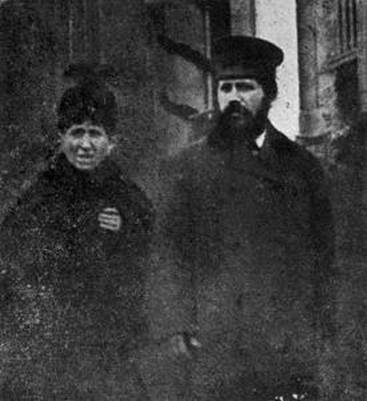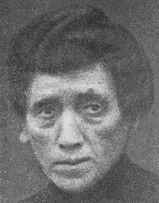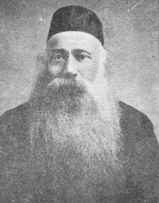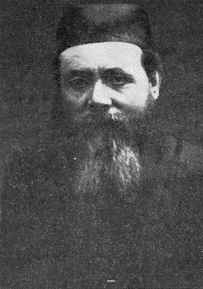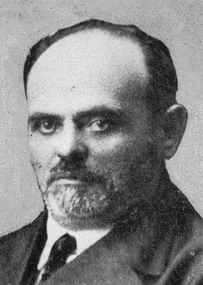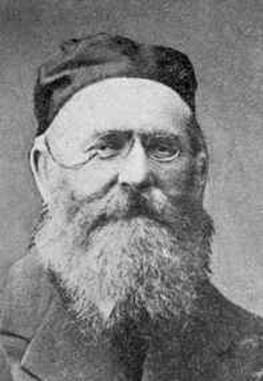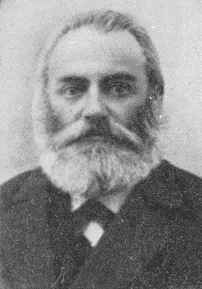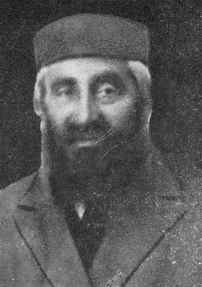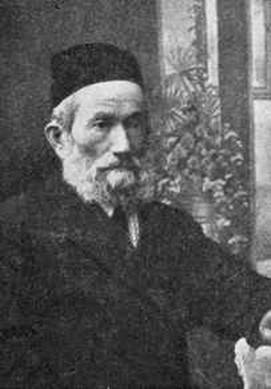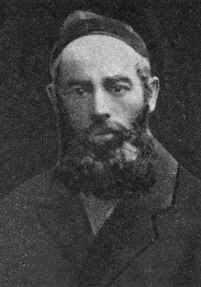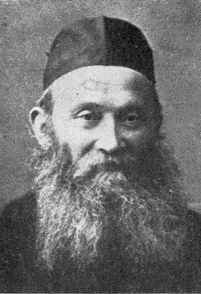Ostrów Mazowiecka
Personalities
Reb Berisz Szapiro z”l
Translated by Ros Romem
Reb Berisz Szapiro was the son of Rabbi Icchok HaRif, the Mitnaged Rabbi of Slonim, an extreme opponent of Hasidism and the rebbes. He was rich, owning a woven goods store that he never entered. His wife Sara Szejndel was a capable woman and looked after the shop.
Reb Berisz studied day and night. Excerpts from his novel interpretations of the Torah can be found in books written by his father the gaon. He was an expert on numerology and had a very rich rabbinic Talmudic library in his home.
He prayed at the new besmedresh “The Citadel of the Mitnagdim” and belonged to the Khevra Tavat. The members of the society remained covered by their prayer shawls to study a page of gemara and tosefus every day after morning prayers. He would read the lesson. He was astute and wise. Like father like son
He died in 5663 [1903]. Rabbi Jechuda Lejb Gordin gave the eulogy.
Reb Wolf Ber z”l
Translated by Ros Romem
Reb Wolf Ber was dean of the Yeshiva first grade. He was an Amszynower Hasid of dignified appearance. His beard was large, his forehead shiny, a clever man among the clever. He was happy with his lot as befitted a Hasid who was among those sitting closest to the Admor at his table.
He would give his lesson pleasantly, with a clear voice, which echoed in every corner of the large hall.
Everything about him spoke of Jewish nobility and gentility. He wore the crown of the Torah on his head with pride.
His wisdom and his Torah lit up his face. He was completely filled with hidden light that he radiated and which ennobled him to everyone very close to him.
His famous Hebrew writer son-in-law, C. Z. Wejnberg, gave an accurate description of his father-in-law in his autobiographical book “Drachim Availot” [“Ways of Mourning”].
“This is an old Jew, more than 70 years of age, with a noble countenance, head of the town Yeshiva, clever, wise and a distinguished Torah scholar. He spent most of his life in poverty and distress, suffering many family tragedies. And he came away from them cleansed and purified. Now a widower, he bears the burden of his sons and daughters in his old age, but still full of strength and might he knows how to overcome the sorrow of his family members and to banish sadness from the house.
After he had passed his wisdom and Torah on to his family members he found time for G-d. The Shabbat table became the holy altar for him and his songs overflowed with enthusiasm removing him from the worries of the workweek.
Once on Shabbat, there was a commotion, as a rumor spread that the gentiles in the town suburbs had started to attack Jews. The neighbours fled to the centre of town, to a safer place. Only the elderly Reb Zew Dow, [Yid. Wolf Ber] interrupted momentarily from his prayers, immediately returned to his rest and to calm the members of his household. And by the light of his face and through his humour the storm was forgotten and he continued on with his melodies and songs as a sacrifice to G-d”.
May his memory be blessed.
Reb Nissen, z”l
Translated by Ros Romem
Reb Nissen was yeshiva dean for the second grade. He was short, gaunt and his pale face, without a drop of blood, was like mustard. His eyes – red from lack of sleep. He was an early riser. He obeyed the commandment Yiruha im shemesh.
He was one of the most pious Mitnagdim, the most careful, as precise about easy commandments as strict ones. He practiced in the manner of the Vilna Gaon. He wrapped himself in a tallit and was crowned with tefillin all day long.
He would say: Every day is the Day of Atonement and a person must admit to his sins, make peace with his friends and deal with his conscience. “Happy is the man that fears always” from fear of the kingdom, the kingdom of heaven. And the burden of the kingdom of heaven was his guiding light. He tried to be among the humiliated, not the offenders, hearing their abuse but not replying and he instructed his pupils in this manner of self-renunciation.
He did not eat chadash. Every night he performed Tikn Khatzos [midnight prayer service]. He was an enthusiastic Zionist and bought a share [in the World Zionist Organization]. The fanatics among the Hasidim attacked him, and spoke harshly about him for “the crime of Zionism”, but he took no notice of them. He heard their abuse and didn't even blink.
|
|
Fejga Zisel Bromberg and her son Jakob |
|
|
|
Reb Nachman Goldberg and wife Ester Perl z”l
By Rabbi A.I. Bromberg, Jerusalem
Translated by Aviva Chrust Komaroff & Roslyn Joffe
Nachman Goldberg was the son-in-law of Abraham Icchok Bromberg and his wife Fejga Zysel, who was the most famous woman in the region. He was born in Trestyna, a town near Bialystok and was a merchant, banker and head of the community until World War One when he settled in Warszawa, where he died in 5686 [1926] at the age of sixty-nine.
He was a very good-looking man, well dressed. He was religiously observant and strict about light as well as serious matters. By Friday noon, he was already prepared to welcome the Sabbath. He was flawless in all of his conduct.
It happened once, when he was living in Warszawa, that one of his neighbours left his store open Friday night. Reb Nachman Goldberg came back from the synagogue, and upon passing by the store and seeing that it was open, he burst out crying and wailing, struck his head against the wall of the house and cried out bitterly that a Jew would desecrate the Sabbath openly. Many people gathered around him, because everyone in the neighborhood knew him; he did not calm down until the Jew closed his store.
In the beginning he was a Mitnaged, but during the years that the Admor Reb Josef Kalisz officiated in the Rabbinate of Ostrow, Reb Nachman Goldberg became one of his closest Hasidim. His son-in-law, Reb Abraham Jakob Frydman z”l, also a Mitnaged, was a great scholar at the Wolozyn Yeshiva and a childhood friend of Chaim Nachman Bialik z”l.
Ester Perl e”h, the eldest daughter of the famous and generous Fejga Zysel Bromberg e”h and wife of the banker Reb Nachman Goldberg z”l, was a paragon of a housewife and devoted mother of sixteen children. Her entire life she managed the large textile store in the city, and her husband managed the bank.
When World War One broke out she moved with her family from Ostrow to Warszawa and died there the 9th of Iyar 5677 [1917].
[Page 43]
|
Reb Gdalia Dawid Morgensztern z”l
From the 1958 Yiddish book “Thirty Years” by Aba Gordon, page 220
Translated by Aviva Chrust Komaroff & Roslyn Joffe
Born in Nowogród, near Lomza. He married Chaja Kejla, daughter of Reb Lewi Kieliewicz of Ostrowa – one of the grandchildren of the city – and settled here.
He was an important and respected landlord in the city, an ardent Mitnaged. He prayed at the new beit hamidrash [Yid. Besmedresh] on Broker street [ulica Brokowska] which was the Mitnaged stronghold in the city.
Every day he went to pray Shacharit [morning prayers], Mincha [afternoon prayer] and Maariv [evening prayer] and stayed there for study and learning after prayers. He was a noble and marvelous type of Jew from a previous generation. He fulfilled every Mitzvah [commandment] with precision in all its details.
He was meticulous about light as well as important matters. He did not want to sign a general letter of the congregation if it was addressed to a man who did not serve in the capacity of a Rav and the letter addressed to him used the conventional title Reb So and So.” Also he did not call anyone “Rabbi” unless the Jew was at least ordained.
Thus he fulfilled with extreme meticulousness the positive commandment “distance yourself from speaking lies” (Exodus XXIII). He was a man of truth in the full meaning of the word. He comported himself in accordance with the Shulchan Aruch, he did not deviate from it at all and he did not add nor subtract [from it]. He was a man of Torah and wisdom. He knew the Tanach [Bible] by heart and the Hebrew language inside out and was exact in Hebrew grammar.
He also knew several languages and engaged in writing requests to the courts and government agencies in Russian, German and Polish.
He was a member of the first Hovavei Zion and joined the Zionist camp afterwards. When a letter was received from Dr. Bernsztejn-Kohn requesting that a delegate be sent to the Congress of all the Zionist organizations in Poland, to take place in Warszawa, the Ostrowa Zionists resolved on the wonderful abilities of Reb Gdalia Dawid Morgensztern, sent him as a delegate to the Congress. At that time he was not an official member of the Zionist organization, but he was a well known intellectual and an acquaintance of the writer Nachum Sokolow, editor of Hatsfira [“the sounding of the siren,” a Hebrew newspaper]. They thought that by having this honour conferred upon him, they would get him to join the organization and become active. However, he declined at first to be their delegate because he was not an official member of the Zionist movement.
However, they informed him that at the Congress he would meet with Sokolow. A precious opportunity like this he could not pass up. He went.
Upon his return, he was an ardent Zionist, and even engaged in propaganda for the Zionist idea at meetings.
He died at the age of 70 in the year 5682, [1922] in Ostrów Mazowiecki.
May his memory be blessed.
[Page 44]
|
Reb Icchok Morgensztern z”l
Translated by Isaac Peled (Podbielewicz)
He was the son of Gdalja Dawid and Chaja Kejla Morgenstern z”l. He was one of the remaining members and founders of the great Zionist movement, Hovevei Zion.
As a member of Mizrahi, he worked his whole life towards the revival of the Israeli people. He was an intelligent and honourable man. Always linked to tradition, to Jewish wisdom and other people. Was full of Torah, wisdom and knowledge. Very cultivated, knew languages and spoke Hebrew perfectly. He was an expert in Bible and knew grammar to perfection.
He was a bookkeeper by trade and worked for institutions and private businesses. For many years he worked as a bookkeeper in banks and was outstanding in his job especially as he had an unusual and wonderful memory.
Easy going and appreciated by peers and friends. Reb Icchok Morgensztern z”l died a few years before the outbreak of the war and fortunately did not see the troubles besetting European Jewry.
May his memory be blessed.
[Page 45]
|
Reb Michel Teitel, z”l
By Arija Margolis
Translated by Ros Romem
I cannot conceive of an Ostrowa community “memorial book” that would not describe the activities of Reb Michel Tejtel, z”l, one of the noble personalities, a doer of good deeds, of whom our community was always proud.
I had the honour and the pleasure of being one of his close and faithful friends and working with him in important public institutions and that is how I became aware of his special qualities.
Reb Michel was blessed with all the good that G_d can bestow on one of his beings. He was a person of gentle character both towards himself and his fellow human beings. On the one hand, a perfect family man deeply attached to all the members of his family and on the other hand, a true community worker willing to devote all his time and energy to public and individual needs.
He was attached by every fiber of his soul to the laws of Judaism and its traditions. He understood and appreciated the spirit of progress. He studied at the synagogue and made time for Torah. He was well versed in general knowledge, obtained from primary sources. He was a great reader, dedicated to ancient and modern Hebrew literature. He was familiar with modern literature and current problems, with the attitude of a noble soul and a genuine distinguished democrat.
The pleasant combination of qualities I previously mentioned placed him at the head and in charge of every public activity. As Reb Michel Tejtel, z”l was known to all the community activists, his involvement in any public activity assured its success in advance. Therefore, everyone agreed to help him so that he would in turn help them, thereby assuring the success of their venture.
He was one of the first members of the Zionist group Hovevei Zion. His love for his people and for his land knew no bounds. His greatest desire was to see our land being rebuilt, flourishing and being settled– builders swarming towards it from all corners of the earth.
With this in mind he answered the call of the famous Gaon, Rabbi Reb Szmuel Mohilewer, z”l, Rabbi of Białystok and he registered with “The Society of One Thousand”, hoping to immigrate to Israel. Even after that society did not succeed in achieving its goal, he did not give up and aspired to immigrate to Israel, but he was not successful.
He became very ill and did not recover. He died in Elul 5690 [August 1930] at seventy years of age. May his soul be bound up in the bond of life.
Reb Michel, son of Iser, Tejtel, z”l
By Sinai Kac
Translated by Ros Romem
Reb Michel Tejtel, the veteran Zionist community worker, could have glorified and honoured a community much larger than our town, Ostrów Mazowiecka. When I met him he was already getting on in years, a man of vision, an educated man. He was the bookkeeper of the Tejtel family sawmill, a large family in Ostrowa, but I never meet him in a professional capacity – his vocation was the building of Israel with which he was occupied day and night without pause, without rest, tirelessly. First and foremost he devoted himself with all the enthusiasm of his soul to Keren Kayemet. No one questioned his authority and the Zionists from Hashomer Hatsair to Betar accepted his rules and obeyed his orders. He concentrated on activities to aid the funds, encouraged the community activists and motivated them to greater achievements. He collected money himself as an example to the young people and he knew how to make demands of those people who could and should give. It was impossible to refuse him, even when a penny was not to be had. He visited people in their homes, but he also asked people to come to him. It was difficult to oppose him and against your will you would come to him and contribute according to his wishes. In the last year of his life he was very ill, but even on his deathbed he did not stop working and the volunteers would gather at his bedside to get their orders. Because a personality like this headed the Zionist activities in our town, the work did not suffer even during the difficult years for Zionism in Poland, 1925-1926. There was a great crisis in the country after Grabski came to power in Poland.
Ostrowa placed third in collecting money for Keren Kayemet, behind Warszawa and Radom. More than once while contemplating the achievements of our generation, the generation of change, to a life of freedom and liberty in an independent state, Reb Michel Tejtel would appear before my eyes. I know, thanks to him and other such community activists who lived and worked in the Diaspora, that I live here in the State of Israel.
May his memory be blessed.
|
My Father Reb Cwi Hirsz Tejtel z”l
By his daughter Chaja Klara Pokrzywa, Haifa
Translated by Aviva Chrust Komaroff & Roslyn Joffe
By his deeds will a youth be recognized. From his earliest steps in the heder he excelled in his abilities. He learned Gemara and also acquired knowledge of languages.
When he grew up he helped his father in his business, in the lumber business.
After his marriage, he devoted his time to his business. He bought sections of forest for cutting trees. He supplied trees for the army. He built barracks. In his contracting, he excelled so much that the authorities awarded him a gold medal for his alacrity and industriousness. He was also an industrialist. The first factories in the city of Ostrow Mazowieck were ours. The first sawmill for trees in the city was his.
Afterwards, he established the first electric power station, in the suburbs, that supplied lighting and power to the whole city. He was a devoted Zionist and contributed to the building of the Land of Israel. He had an open hand. During the winter months he donated trees to supply the poor of the city.
During the German occupation, he became the deputy mayor. He was smart, and many people used to come to ask his advice. He died 26 November 1919.
May his soul be bound up in the bonds of life.
|
Reb Icchok Podbielewicz z”l
Translated by Isaac Peled (Podbielewicz)
Icchok Podbielewicz was born in Szumowo, a village near Ostrowa. He studied at the Lithuanian yeshivas, Bar Orin and Bar Daat and lived with the progress of time.
Although his big business (kerosene, gas and oil) demanded a lot of his time for administration duties, he spent time studying Torah and was a member of the honourable Strykower Hasidim. He was also active tending to people's needs and a trusted, active member of Mizrahi. He was elected as the representative to the kehilla and a member of the city's Board of Administrators and occupied the position of Alderman until his death in the summer of 5690 [1930].
May his memory be blessed.
Reb Isachar Srebrnik z”l
Translated by Ros Romem
Reb Isachar Srebrnik z”l my teacher, an honorable man, was known as a outstanding scholar. He accepted only smart and diligent children into his heder. Reb Isachar was one of the “progressive” teachers. The pupils sat in a special room and not together with the members of his family, as was usual with other teachers. Every week on erev Shabbat when he taught the Portion of the Week he would elucidate it for us with his commentary, full of wisdom and good judgment. When I was a boy I did not dare to ask him from whence he drew his commentaries and I went about full of thoughts that did not give me rest, until one day the mystery was solved for me. While following Reb Isachar I saw him hide a book in a corner of the shelf. I took out the book and read the portion he had explained to us and there I found everything he had told us. It was a Pentateuch with a commentary by “The Malbim”, who was not accepted by the fanatics and Reb Isachar was one of those people who secretly used it.
[Page 49]
|
Reb Szmul Jozef Margolis z”l
By his son Arija Margolis
Translated by Aviv Chrust Komaroff & Roslyn Joffe
He was born in Ostrowa in 1858. His father was Reb Hirsz Bunim z”l and therefore he was known in the city as “Joske, Hirsz Bunim's,” the son of an honoured family that was related to Spanish exiles who moved to Poland hundreds of years ago.
He was one of the Yeshiva students who did not neglect their Torah even after they matured. He set aside time for Torah and was meticulous about light as well as important matters. Devout about the Torah of G_d and Mosze his servant that bordered on fanaticism and was prepared to struggle until the end of Yoreh De'ah [one of the four parts of the Shulchan Aruch] in the matters of law in accordance with the Shulchan Aruch.
After he married, he moved to Warszawa to try his luck in business, and there he sought his fortune. “Probodnik”, which was in Riga, hired him as part of the office staff, as a representative of the agency. “Probodnik” was a well-known manufacturer of boots [galoshes] and other rubber products.
In the shop in which he worked for many years, there were scores of clerks working for him. Among them there were even highly educated people. They were of the new generation and free in their opinions, the deceased [Reb Margolis] remained faithful to his life's source – Torah and Mitzvot, and did not change the direction of his life and did not learn from their deeds.
This devotion of his, actually found favour in the eyes of his colleagues and the directors of the shop, and they all respected him and appreciated his way of life.
After the death of his wife Rachel Leja a”h – in the year 1913 – he returned to the city of his birth, Ostrowa and lived there until the day of his death.
He was among those who prayed at the new beit hamidrash [Yid. Besmedresh], where he also set aside time for Torah study and participated in daily Talmud study, which was learned every evening after Maariv. He also dedicated time to community work and as the director of the hospitality society, he worked and was involved in its matters until his death on the 12th of Kislev 5694 [29/30 November 1933] when he was 75 years old.
May his soul be bound up in the bond of life.
|
Reb Pesach Ari Landau z”l
By his brother-in-law Arija Margolis
Translated by Aviv Chrust Komaroff & Roslyn Joffe
The deceased was one of the seven sons of the famous Hasid Reb Simcha Bunim z”l, who were all reverent.
He was born in the year 5638 [1877/78] in a village near Ostrów Mazowiecki. Like his father, who was devoted all of his life (shreiber in the local language) to the lumber industry, he was engaged in the same occupation.
From birth and up until his youth he learned with a melamed who was employed in the town as was the custom in those days. After he grew up he moved to Ostrowa and studied in the Gerer hasidic school and also with the renowned Hasid Reb Ben-Cjon Ostrower zz”l.
Some years later he married Maradl, the eldest daughter of Reb Szmul Jozef and Rachel Leja Margolis z”l, one of the most important and respected people in the city. He continued to engage in his occupation of forestry and trees.
After a number of years, he moved to the train stop Szpetowa, near Wysokie Mazowiecki, on the road to Bialystok.
At this station there were few Jews, and he held a minyan in his house and he also excelled at hospitality to passersby who chanced by his house. If his income was limited, as he was a husband and a father of ten children, he did not despair. He always trusted in G_d to bless him and provide him with sustenance, and by means of this deep faith, he lived his life, the life of a man who always acted justly and spoke the truth in his heart, who did justice and mercy all his days.
A special affection for Israel burned in his heart and his life's dream was to make aliyah to the land of Israel with his family. In 5684 [1924] – the year before he died – he decided to make aliyah. He tried to obtain a visa, but he did not get word and on the first night of Sukkot 5686 [2 October 1925] his soul was returned to his G_d when he was only 47 years old.
His wife and seven of his children were killed in the Shoah and only two of his daughters and one of his sons managed to make aliyah and to put down roots in Israel. And this consolation for those who knew him will be kept and be a blessing for them forever.
May his soul be bound up in the bonds of life.
|
Reb Mejer Leszcz z”l
Translated by Aviva Chrust Komaroff & Roslyn Joffe
He was born near Ostrowa and after he married Chaja Gitel, daughter of Reb Chaim and Rywa Wszawer z”l, one of the most illustrious families in our city, he settled there.
He started small – fortune smiled on him and he quickly became one of the large wholesalers of food products and markholet and especially prospered in the marketing of sugar, being the sole representative for a number of sugar refineries in Poland.
Learned and an outstanding hasid of the Admor of Aleksander the master of Yismakh Yisrael and one of those at the head of the Admor's table of Aleksander ztz”l.
For many years he represented the ultra-Orthodox on the Kehila, and he was also active in a number of other community organizations, in the Khevra Kadisha [burial society] and on the board of the Maot Khittin. He was also among the first founders of the credit and savings bank before World War One and after it Bank Spóldzielcy [Cooperative].
The deceased made an impression also in his external appearance, being an imposing figure, and sported an attractive beard.
Many people came to consult with him on business and community matters, for he was known for his intelligence.
Although he was devout and a Hasid – he was considered to be and was sometimes among the contributors to Keren HeYesod [Zionist, Foundation Fund].
He merited to raise a large family – 7 sons and 3 daughters, and they all received a traditional [religious] and national [secular] education, Torah and knowledge, they belonged to the Zionist movement and were devoted to it and active in it, each according to his desire.
He died at the age of 70 in 5695 [1935].
May his soul be bound up in the bonds of life.
